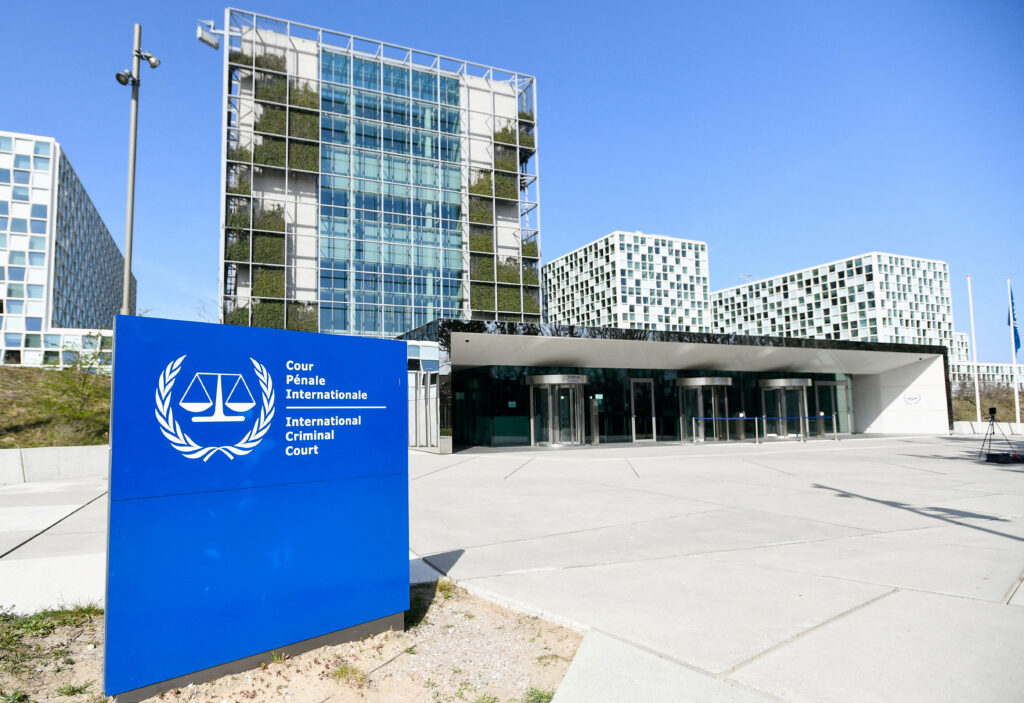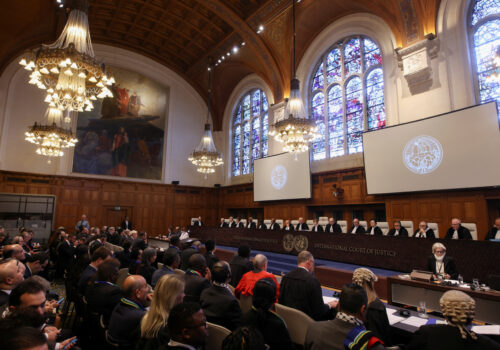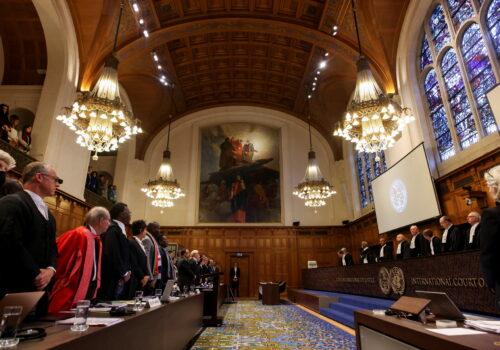In the last two weeks, the Israeli government has voiced concern that the International Criminal Court (ICC) will soon issue arrest warrants for Israeli officials in connection with the war in Gaza. On April 26, Israeli Prime Minister Benjamin Netanyahu said that “Israel will never accept any attempt by the ICC to undermine its inherent right of self-defense,” and two days later, he reportedly asked US President Joe Biden for his help to prevent the ICC from issuing any warrants.
Will the ICC indeed issue the arrest warrants? That question cannot be answered yet, but seven other important questions associated with this issue do have answers now.
1. Does the ICC have jurisdiction?
If the ICC exercises jurisdiction in relation to the Gaza war, then it would be based on the fact that the Palestinian authorities in Ramallah have accepted the court’s jurisdiction. The State of Palestine has been a member of the ICC since 2015. Importantly, this has consequences even for Israel, which has not signed onto the ICC statute. Pursuant to well-established legal rules and principles, the Palestinian Authority can exercise jurisdiction over crimes on its own territory and its nationals. Thus, the Palestinian Authority also can give the ICC the same powers, namely to exercise jurisdiction over alleged crimes committed by Israeli forces in Gaza or crimes committed by Palestinian groups such as Hamas.
This is the same principle that allows the ICC to investigate and prosecute crimes by Russia in Ukraine. It would be unfortunate if the United States and its allies would use the same arguments against the ICC as have been heard from Russian President Vladimir Putin regarding the warrant issued for his arrest.
The US position is currently that “the Palestinians do not qualify as a sovereign state and therefore, are not qualified to obtain membership as a state in, participate as a state in, or delegate jurisdiction to the ICC.” It is worth looking more closely at this argument.
First, full United Nations (UN) membership is not a requirement to qualify as a state. Nevertheless, the status at the UN may be indicative, and in that context it is worth noting that the United Nations General Assembly (UNGA) in Resolution 67/19 decided to “accord to Palestine nonmember observer State status” at the UN in November 2012. Second, some 139 out of 193 UN member states have recognized Palestinian statehood. Third, the ICC Pre-Trial Chamber in 2021 concluded that “regardless of Palestine’s status under general international law, its accession to the [ICC] Statute followed the correct and ordinary procedure,” noting that no ICC party (except Canada) objected to its joining in 2015. Finally, the argument that Palestinian authorities do not have full control over the state’s purported territory would have prevented the United States and other like-minded states from recognizing Croatia (1992), Bosnia and Herzegovina (1992), and Kosovo (2006) as states.
2. Who would the ICC charge and what would it charge them with?
Any charges from the ICC would be against individuals, most likely senior Israeli officials and military leaders, and not against the state of Israel itself. Some reports suggest that any issuance of arrest warrants against Israeli officials would also be accompanied by a set of separate arrest warrants against Hamas leaders. In such a scenario, it would be odd if the United States and its allies would try to subdue the ICC.
ICC Prosecutor Karim A. A. Khan’s speech on October 30, 2023, might offer some indications of the types of charges the ICC may bring. In that speech, he talked about the principles of distinction and proportionality, as well as Israeli settler violence and land grabs in the West Bank. He also mentioned denial of access to food and medicine to the civilian population of Gaza, Hamas rocket attacks on Israeli civilians, and attacks against civilians and hostage-taking on and since October 7, 2023.
3. Can Israel preempt the investigation?
Israel is much different from, for example, Russia in being a parliamentary democracy where the power of government may actually change after an election. Israel also has independent courts. Should this not be considered? The ICC statute does show deference to functioning legal systems by its principle of complementarity—the ICC is only meant to exercise its jurisdiction in circumstances when a national legal system cannot or will not carry out its own proceedings.
Both Palestinian authorities and Israel could preempt and make investigations and trials inadmissible at the ICC if they engage in genuine investigations and prosecution in their own domestic systems. While it is very unlikely to happen in Gaza under Hamas rule, this is a potentially feasible option for Israel as long as such proceedings are genuine.
The efforts by Israeli authorities to improve practices after the strike that killed seven World Central Kitchen aid workers on April 1 are relevant in this context. Israel has taken steps to include nongovernmental organization liaisons in a joint situation room and raise the approval level for such strikes, and the Israeli military has punished several officers for their role in the strike. The measures taken after the April 1 strike do not mean that Israel in general is in the clear. Rather, it is an illustration of the type of action, taken on a broader front, that might persuade the ICC to abstain from investigations and prosecution.
4. What about Israel’s right to self-defense?
Following earlier statements by Israeli officials, Netanyahu on April 26 underscored the argument that Israel’s right to self-defense was at stake. Would the right to self-defense be undermined if the ICC proceeded? The answer is that the ICC does not have jurisdiction in the context of the Gaza war on the right to self-defense.
When the ICC prosecutor has indicated that his team is investigating both parties in the conflict, this has related to war crimes and to crimes against humanity. No mention has ever been made of the right to self-defense. While it is clear that Israel has the right to protect its population, there are also limits when exercising this right, something also acknowledged by Israeli officials. When there is a dispute as to whether these limits have been respected or not, the most reasonable arbitrator is arguably the ICC.
There have been several attempts to persuade the ICC prosecutor to bring charges in relation to Israeli acts in the past, including after the Mavi Marmara incident in 2010, the Israel-Gaza war in 2014, and Gaza-Israel clashes in 2018. But none of those investigations resulted in charges against Israeli government figures. Importantly, the ICC has investigated several conflicts and prosecuted crimes in other parts of the world, which should counter allegations that the prosecutors are only targeting Israel or seeking to undermine the country’s right and obligation to protect its people.
5. What about a potential ceasefire?
There are valid concerns that ICC arrest warrants might interfere with negotiations with Hamas on a ceasefire and the release of hostages. The Biden administration argued in 2021, before the current war, that the ICC has a responsibility to act constructively and that by issuing arrest warrants it will make the Israeli-Palestinian conflict worse.
Israel has in recent days told the United States that it will punish the Palestinian Authority if the ICC issues warrants. Such threats are misguided, since it is the ICC prosecutor, not the Palestinian Authority, who brings requests to a panel of three ICC judges to confirm any arrest warrants. Nevertheless, there is a legitimate argument that efforts to deescalate a war should take precedence over efforts to bring criminal justice.
At the present stage, however, the question of efforts to deescalate the war between Israel and Hamas is neither a matter for the ICC prosecutor nor the Palestinian Authority. The UN Security Council—where the United States and its allies have a significant voice—may under article sixteen of the ICC statute freeze any investigation or prosecution for one year, a term that is renewable, for the purpose of facilitating such negotiations. This would be clearly in line with US positions. China or Russia might see an interest in sabotaging US diplomacy; however, it would run counter to their previous positions if they would prioritize proceedings at a court they do not recognize over a ceasefire between Israel and Hamas.
6. How should the United States respond?
Several top US lawmakers have preemptively come out against the ICC issuing warrants. On April 29, House Speaker Mike Johnson said, “Such a lawless action by the ICC would directly undermine US national security interests.” The next day, Senate Majority Leader Chuck Schumer said, “The ICC has been biased against Israel for decades.” Republicans are threatening to sanction ICC officials, a step the Trump administration took in 2020 amid ICC investigations into potential US war crimes in Afghanistan.
However, the United States and its allies should respect the independence of the ICC and not interfere with the court’s proceedings. If necessary, they should provide support under the ICC statute cooperation regime. It is unrealistic, considering the close ties between the United States and Israel, to expect the United States to arrest Netanyahu should the ICC issue a warrant for his arrest, for example. But consider what happened in South Africa, where the ICC arrest warrant against Putin led to his cancelled in-person participation in the 2023 BRICS summit. There, South Africa’s obligations to the ICC were tested against loyalties to allies, resulting in Putin’s absence at the summit.
Even if one supports Israel’s right to defend its people, the countries seeking to promote international justice should apply the same standards regardless of who is being sought by the ICC. If the ICC does charge Israeli officials, the US government could let them know they are not welcome in the United States until the case is resolved. At the very least, proposals on sanctioning ICC officials should be put to rest.
The ICC prosecutor has responded to the overtures from US congressmen by stating that his office welcomes comments and engagement in its activities from state and elected officials, nongovernmental organizations, scholars, and activists. However, his office has insisted all attempts to impede, intimidate, or improperly influence its officials should cease immediately. This appears unlikely to sway all of the members of Congress.
7. What risks does this case present for the legitimacy of the ICC?
The ICC, still a relatively new organization, has been losing legitimacy among many African countries, which say that they have been disproportionately targeted by ICC investigations. Elsewhere, the Philippines withdrew from the ICC in 2019 after the court said that it would investigate Manila’s war on drugs.
While an arrest warrant for Netanyahu or other top Israeli officials might be cheered in many places, it may also create challenges for the ICC in the sense that some of its strongest backers among European states also are committed to the safety of Israel. This dilemma is most obvious in relation to Germany, which has taken upon itself the dual heritage from World War II: both to promote international criminal justice in the spirit of the Nuremberg tribunal and safeguard the existence and safety of the state of Israel.
Those are obvious concerns for some states that they need to deal with. However, the court operates under a somewhat different logic. While the legitimacy of the ICC is of utmost importance, the court’s prosecutors and judges should be guided and constrained in their decision making by available facts in the specific situation and the ICC statute, not geopolitical interests. This is the only manner in which the court’s long-term legitimacy may be upheld and expanded. To the extent that geopolitical considerations are to be made, they are the responsibility of the UN Security Council.
Mark Klamberg is a nonresident senior fellow with the Atlantic Council’s Strategic Litigation Project. He is a professor of international law at Stockholm University and currently residing in Washington, DC, where he is affiliated with American University’s School of International Service and Carter School for Peace and Conflict Resolution at George Mason University.
Further reading
Fri, Jan 12, 2024
Five questions and answers about South Africa’s genocide case against Israel
New Atlanticist By Lisandra Novo
A former judicial fellow at the ICJ explains what you need to know about the case and what to expect going forward.
Wed, Apr 19, 2023
Holding the Islamic Republic of Iran accountable for atrocity crimes
Issue Brief By Celeste Kmiotek, Alana Mitias, Nushin Sarkarati
Under the principle of universal jurisdiction, certain domestic justice systems allow prosecutions in national courts for crimes committed abroad, regardless of the victim’s or perpetrator’s nationality. This manual outlines the universal jurisdiction process in selected European states for those pursuing prosecutions of crimes committed by the Islamic Republic of Iran.
Fri, Feb 16, 2024
Could the US and other states be implicated in South Africa’s genocide case against Israel?
New Atlanticist By Celeste Kmiotek
The International Court of Justice case could inspire proceedings against other states for complicity in or failure to prevent genocide.
Image: An exterior view of the International Criminal Court in The Hague, Netherlands, March 31, 2021. REUTERS/Piroschka van de Wouw/File Photo



